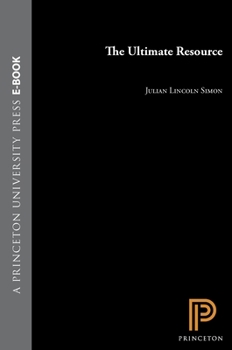The Ultimate Resource
Select Format
Select Condition 
Book Overview
A lively answer to those who sound alarms about population growth and resource use
The Ultimate Resource challenges conventional beliefs about the scarcity of energy and natural resources, the pollution of the environment, and the perils of overpopulation for our standard of living. In this provocative book, Julian Lincoln Simon argues that natural resources are not finite in any meaningful way, and that using such resources now will not slow the rate of future economic growth. In the short run, all resources are limited. A greater use of any resource means pressure on its supply and hence an increased price. In the long run, however, history shows that human creativity overcomes natural obstacles to economic growth and leads to a lower cost and price than before. The ultimate resource, Simon contends, is the human imagination coupled to the human spirit. This timely book will fundamentally change how you think about a host of issues, from immigration and human fertility to forecasts of population change and the use of taxpayer dollars for population control. The Ultimate Resource demonstrates that the primary constraint on our national and world economic growth is our capacity for the creation of new ideas. The more people who can be trained to help solve the problems that confront us, the faster we might remove the obstacles, and the greater the economic inheritance we can bequeath to our descendants.Format:Hardcover
Language:English
ISBN:069109389X
ISBN13:9780691093895
Release Date:August 1981
Publisher:Princeton University Press
Length:418 Pages
Weight:1.70 lbs.
Customer Reviews
2 ratings
Wonderful. Much needed. Now more than ever.
Published by Thriftbooks.com User , 19 years ago
I was first introduced to the first edition of the book while in college many years ago. I always like to go back and read even now. Simon pulls apart many radical environmentalist myths in one fell swoop, explaining that beyond oil, fiber, and chemicals, the ultimate resource is the human mind which has always had to adapt. And adapt it will again, not because of some Darwinian survival mechanism set on autopilot to find new ways of living, but rather the true thinking of things through via the human mind's creativity. His examples are many, but primarily he shows that overpopulation is a Malthusain myth and that rather than a crunch of human flesh in the world, we are far more likely to find birthrates falling with rapid industrialization. That's the first point--see America and Europe on this one, as proof he's correct, in that being a one child producer per family or even no children for marrieds is the hottest trend in many nations, with even negative consequences for issues like societal stability and welfare and pension plans, social security, retirement benefits, labor force needs, etc. Secondly, for those areas that the Mainstream Media and social science pundits are always pointing to as dire warnings about the dangers of overpopulation and still have cultures that value large families (as in many parts of the Mid East and Asia), it would seem the real problem is lack of liberty, horrid political arrangements, lack of industrialization, and lack of infrastructure and modern farming methods that seem the real culprit in human suffering. This actually makes sense, unlike what we were probably taught in school (i.e. that "overpopulation" is a generic term that means distress regardless of context). There is much more, but these are the basic highlights. The book also details several resources and the reality of how continued exploration and replacement of some items actually reduces the prices consumers must pay for the upkeep of industry and other life activities. A wonderful "resource" to have on one's shelf in any case to counter the incessant propoganda of UN studies and Planned Parenthood and dozens of other groups who purport to care aobut humanity but think limiting it is the key to human happiness. Simon shows just the opposite, to wit, human fecundity and happiness are luckily tied together. -W.T.
Exposes Over-Population Myth
Published by Thriftbooks.com User , 28 years ago
For a non-fiction, it was good reading. This was the first book to show me why "overpopulation " is not a problem.






